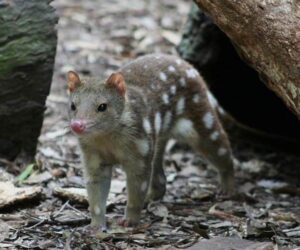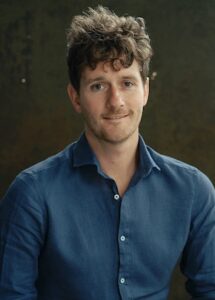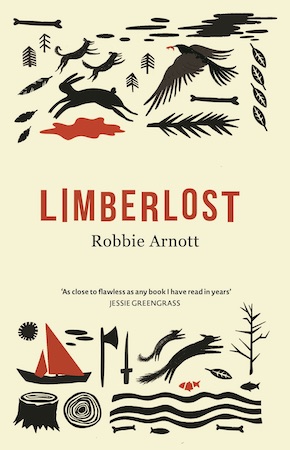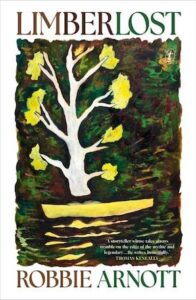Robbie Arnott: Untamed nature
by Mark ReynoldsIn the heat of a Tasmanian summer, with the world at war and his brothers away on secretive missions in the Pacific, 15-year-old Ned West traps, shoots and skins rabbits to sell their pelts in the hope of saving to buy a small boat. As his father and older sister struggle to keep the riverside family orchard afloat, an unspoken yearning lingers for the brothers’ safe return. Ned’s choices that summer will shape the decades that follow, not least the accidental capture and eventual release of a fierce quoll caught in one of his rabbit traps, and a growing attraction to Callie, the energetic and pragmatic sister of his mercurial best friend Jackbird. The quoll’s suffering as the flesh of its hind leg was torn by the trap puts Ned in mind of his father taking him and his brothers when he was five to the mouth of the river to encounter a supposedly mad migrating whale; an intended lesson in facing up to fear, which unfailingly conjures deep-seated feelings of trepidation and dread.
Mark: The title of the book, and the name of the West family orchard, comes from a 1909 American novel that was a favourite of Ned’s mother. What did that book mean to her, what would Ned have gleaned from reading it, and what links its Indiana setting with Ned’s corner of Tasmania?
This detail is taken from reality – my grandfather grew up on an orchard named Limberlost, which his mother had named in honour of her favourite book, A Girl of the Limberlost. The property held a grove that reminded her of the Indiana forests she’d read in Gene Stratton-Porter’s books.
In his own reflections, I don’t recall Ned once naming the river he grew up on, but he’s rattled when his daughter Sally insists that its true name of the Tamar is the kanamaluka. Ned feels he has the same connection to the river as the aboriginal people who first named it. But Sally does have a point about the brutal massacre of the natives by 19th-century British colonisers…
Ned is bad at communicating, useless with emotions and incredibly hard on himself, but at his core he’s a pretty decent person, I think. He seeks to do the right thing, and always puts his family and duties first. But his great blind spot is his place in the world – in particular, what had happened in order for someone like him to live where he does.
It’s fairly common in Tasmania for descendants of British invaders and convicts to hold history at arm’s length. One of the ways Ned does this is to evade his connection to the horrific realities of colonisation, and that is expressed through his lack of knowledge about the river’s name. When his daughter confronts him about this he’s surprised, because he’s not used to talking about what happened to the people who have lived there and loved that river for 60,000 years before people like him turned up. He’s never felt a connection between himself and the invasion, the war, the massacres. Yet he knows his daughter has a point. He knows she’s right.
What we remember often isn’t the total truth, but the stories we tell ourselves become true in our minds. That’s very true of Ned: he can’t escape himself, no matter how hard he tries.”
Jumping in time from his childhood through marriage and fatherhood to old age, Ned’s thoughts constantly return to that one formative summer, and the earlier encounter with the whale. To what extent do you think people are generally influenced and shaped by experiences in their teens and early childhood?
I think I believe that we don’t find ourselves – we create ourselves. In that sense, experience and memory form a huge part of who we end up becoming, especially our interpretation of events that feel formative, which often happen during childhood and adolescence. What we remember often isn’t the total truth, but the stories we tell ourselves become true in our minds. That’s very true of Ned: he can’t escape himself, no matter how hard he tries.
What drove your decision not to present the chapters chronologically?
Nothing really drove me – I don’t ever feel driven about these things. I just fumbled around with structural ideas and techniques and this way of doing it seemed to emerge as the most coherent way to tell Ned’s story. I wish I had a more reliable way of figuring out how to write. It’s all just intuition and waking dreams.
Limberlost has been described as your first venture into realism. Do you accept that label, and how would you say it differs from Flames and The Rain Heron? For me, it is still imbued with myth, spirituality and lyricism.
Thank you! My guiding thought for this book was to write something that felt as mythical as my first two novels, without actually creating any myths or magic. Generally, though, I don’t think about these things all that much. I just try to present the world on the page as vividly and emotionally as it feels to me in reality. Sometimes that means I write imaginatively, in order to capture something I can’t express in any other way. Other times, I write closer to reality, as with Limberlost, because I feel a surreal or magic element isn’t required.
Ned embodies a complex mix of shame and hesitancy, rage, curiosity, responsibility, love and fear, which are all evident in his interactions with animals and nature. How would you summarise your own relationship with the natural world?
I think I have very similar feelings about the natural world to Ned. I feel drawn to it in a way that I find hard to articulate, and I revel in the feeling of smallness that accompanies immersion in wild landscapes. In character though, I’m not much like Ned at all. If anything, I’m a lot more like his friend Jackbird – talking too much, getting distracted.
Ned’s childhood is marked by the loss of his mother, his father’s fading capacities, financial hardship and two brothers away at war, while in later life he witnesses encroaching human populations and dispiriting deforestation. How much of this is based on the stories your grandfather told you and your cousins about growing up in 1940s Tasmania, and his experiences across the decades that followed?
Quite a lot of it. My grandfather Bruce led a rich, varied life, always working on the land, and the stories he told us were always filled with those details. Many of the scenes in Limberlost are inspired by something that happened to Bruce, or something he did. In many ways, I feel like I’ve been given a remarkable gift. I just had to wrestle it into the shape of a novel.
Are the trapped quoll and Ned’s acquisition and subsequent sacrifice of a rare Huon pine boat drawn from your grandfather’s stories?
They are, although they aren’t totally true to life. My grandfather once accidentally trapped a quoll in an empty bean can while camping on the east coast, which inspired the much more visceral story in the novel. And he really did buy a boat with money earned through trapping and shooting rabbits while his brothers were in the Pacific.
I still feel wary around many mainlanders (our word for Australians). I like them, but I don’t necessarily trust them. They’d wreck the joint if we let them.”
What are the biggest changes you have witnessed in Tasmania in your lifetime? And how does your current life in Hobart compare with your childhood in the north of the island?
Tasmania’s quite fashionable now, especially Hobart – people have cottoned on to the natural beauty, and we have an uber-rich Bond-villain character with an underground lair/adult playground. This all feels very new; when I was growing up, Tasmania was the butt of every joke in Australia. We were inbred, illiterate, stupid, had no culture, no taste, were a waste of space, a blight on the country’s economy, etc. So these sudden changes are strange. I still feel wary around many mainlanders (our word for Australians). I like them, but I don’t necessarily trust them. They’d wreck the joint if we let them.

Tiger quoll at Featherdale Wildlife Park, Sydney. Joshua Cunningham/Wikimedia Commons via Flickr
Are Tasmania’s ecological concerns any less urgent than those on the mainland, where raging bushfires have destroyed the habitats of hundreds of species, including many already critically endangered?
No, unfortunately the concerns aren’t any less urgent or terrible. Tasmania is facing ecological catastrophes as drastic as anywhere in the world. The sea off our east coast is heating far faster than the global average, killing off the once-great kelp forests that grew thick and tall from the sea floor. Dry lightning strikes are igniting slow-burning fires in our highlands, incinerating trees that never evolved to burn, including the fabled Huon pine. Each of these trees takes thousands of years to grow. Once they burn, they are gone forever.
What can writers and artists do to help fix the planet?
I’m tempted to say something like “to shine a light on what’s happening to the world, to tell greater truths through fiction, to inspire people to act with compelling narratives and stories.” But I’m not sure I believe this. I think we just need to do what everyone needs to do: Show up. Protest. Change. Make life uncomfortable for the worst climate actors. Rip and tear at things until those in power start making better decisions.
Which writers have had the strongest influence on your work?
Richard Flanagan, Annie Proulx, Tobias Wolff, Jeanette Winterson, J.A. Baker.
Which contemporary Australian writers do you particularly admire?
Flanagan, as I mentioned. Josephine Rowe. Alexis Wright. Jessica Au’s Cold Enough For Snow is a quiet treasure. The rawness and beauty in Oliver Mol’s Train Lord undid me for a while. I hope Ryan O’Neill writes more books. He’s terrific.
What are you writing next?
I’m not sure. Our first child arrived five days ago, so I’m a little removed from my normal writing routines. All I can say is that I think my next book will feature, or be somewhat inspired by, the following: Patagonia (or the idea of Patagonia), sea cliffs, gauchos, leopard seals, cold fires, ancient navies, feral blood.
 Robbie Arnott was born in Launceston, Tasmania in 1989 and now lives in Hobart. His writing has appeared in numerous magazines and anthologies. He won the 2015 Tasmanian Young Writers’ Fellowship and the 2014 Scribe Non-fiction Prize for Young Writers, and his debut novel Flames (2018) was shortlisted for several Australian literary awards and the Guardian’s Not the Booker prize. His second, The Rain Heron (2020) won the Age Book of the Year Award. Limberlost is published by Atlantic Books in hardback and eBook.
Robbie Arnott was born in Launceston, Tasmania in 1989 and now lives in Hobart. His writing has appeared in numerous magazines and anthologies. He won the 2015 Tasmanian Young Writers’ Fellowship and the 2014 Scribe Non-fiction Prize for Young Writers, and his debut novel Flames (2018) was shortlisted for several Australian literary awards and the Guardian’s Not the Booker prize. His second, The Rain Heron (2020) won the Age Book of the Year Award. Limberlost is published by Atlantic Books in hardback and eBook.
Read more
@RobbieArnott
@AtlanticBooks
Author portrait © Mitch Osborne
Mark Reynolds is a freelance editor and writer, and a founding editor of Bookanista.
@bookanista
wearebookanista
bookanista.com/author/mark



